Mongolia’s former communist party won a landslide victory in national polls, the nation’s electoral watchdog said yesterday as it dismissed vote-rigging claims that triggered deadly riots.
However, the announcement that the Mongolian People’s Revolutionary Party (MPRP) won Sunday’s election drew renewed charges from the losing Democrats that they had been cheated of victory, heightening concerns of further unrest.
“I am deeply saddened that this vote was stolen. It was stolen and there needs to be a recount. The result is false,” Democratic Party leader Tsakhiagiin Elbegdorj said from his office.

PHOTO: AFP
The MPRP won 47 of the 76 seats in parliament, while its main rival and former coalition partner, the Democratic Party, gained 26 seats, General Election Committee spokesman Purevdorjiin Naranbat said.
Independents and minor parties won the other three, he said.
If the results hold, it would mean the MPRP could rule outright after four years of a messy coalition with the Democrats that stymied economic progress in the mineral-rich Asian nation sandwiched between Russia and China.
Earlier charges by Elbegdorj that the MPRP had rigged the outcome triggered Tuesday’s unrest, which saw five people killed as about 8,000 rioters stormed through the capital Ulan Bator.
Naranbat said Elbegdorj’s accusations of vote fraud were without basis.
“The election was organized well and by law. It was really fair,” he said.
“Some people did not accept that their candidates lost. We counted again and again but it was still the same result so there is nothing wrong,” he said.
The government implemented a four-day state of emergency to quell the unrest, which saw the MPRP’s headquarters gutted in a fire, a police station mobbed and the Cultural Palace looted.
Police responded by firing tear gas and rubber bullets at the rioters, then sending soldiers and military vehicles onto the streets of Ulan Bator.
The violence has quickly become recognized as a particularly dark moment in Mongolia’s recent history, as the nation shook off seven decades of communist rule in 1990 without a shot being fired.
The first elections were held in 1992 and, although the nation of about 3 million people has since struggled with corruption and a growing rich-poor divide, the democratic process had proceeded without violence.
“We had many demonstrations in 1990 ... but the organizers would maintain peace,” Mongolian Foreign Minister Sanjasurenngiin Oyun, whose late brother was the leader of the democracy movement, told reporters this week.
“No blood was shed in our democracy movement but the situation has obviously changed,” he said.
Nevertheless, although the state of emergency remained in place yesterday, there were no signs of further violence and soldiers were being taken off the streets.
“The situation has stabilized and there is no immediate danger of violence so armed forces have been removed from strategic positions,” Mongolian Justice Minister Tsend Munkh-Orgil said.
And although Elbegdorj did not accept the poll result, he said he did not expect more riots.
“I think it will be resolved through negotiation. I don’t think there will be more violence,” he said.

Kehinde Sanni spends his days smoothing out dents and repainting scratched bumpers in a modest autobody shop in Lagos. He has never left Nigeria, yet he speaks glowingly of Burkina Faso military leader Ibrahim Traore. “Nigeria needs someone like Ibrahim Traore of Burkina Faso. He is doing well for his country,” Sanni said. His admiration is shaped by a steady stream of viral videos, memes and social media posts — many misleading or outright false — portraying Traore as a fearless reformer who defied Western powers and reclaimed his country’s dignity. The Burkinabe strongman swept into power following a coup in September 2022

‘FRAGMENTING’: British politics have for a long time been dominated by the Labor Party and the Tories, but polls suggest that Reform now poses a significant challenge Hard-right upstarts Reform UK snatched a parliamentary seat from British Prime Minister Keir Starmer’s Labor Party yesterday in local elections that dealt a blow to the UK’s two establishment parties. Reform, led by anti-immigrant firebrand Nigel Farage, won the by-election in Runcorn and Helsby in northwest England by just six votes, as it picked up gains in other localities, including one mayoralty. The group’s strong showing continues momentum it built up at last year’s general election and appears to confirm a trend that the UK is entering an era of multi-party politics. “For the movement, for the party it’s a very, very big

ENTERTAINMENT: Rio officials have a history of organizing massive concerts on Copacabana Beach, with Madonna’s show drawing about 1.6 million fans last year Lady Gaga on Saturday night gave a free concert in front of 2 million fans who poured onto Copacabana Beach in Rio de Janeiro for the biggest show of her career. “Tonight, we’re making history... Thank you for making history with me,” Lady Gaga told a screaming crowd. The Mother Monster, as she is known, started the show at about 10:10pm local time with her 2011 song Bloody Mary. Cries of joy rose from the tightly packed fans who sang and danced shoulder-to-shoulder on the vast stretch of sand. Concert organizers said 2.1 million people attended the show. Lady Gaga

SUPPORT: The Australian prime minister promised to back Kyiv against Russia’s invasion, saying: ‘That’s my government’s position. It was yesterday. It still is’ Left-leaning Australian Prime Minister Anthony Albanese yesterday basked in his landslide election win, promising a “disciplined, orderly” government to confront cost-of-living pain and tariff turmoil. People clapped as the 62-year-old and his fiancee, Jodie Haydon, who visited his old inner Sydney haunt, Cafe Italia, surrounded by a crowd of jostling photographers and journalists. Albanese’s Labor Party is on course to win at least 83 seats in the 150-member parliament, partial results showed. Opposition leader Peter Dutton’s conservative Liberal-National coalition had just 38 seats, and other parties 12. Another 17 seats were still in doubt. “We will be a disciplined, orderly